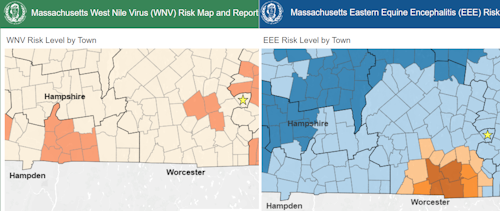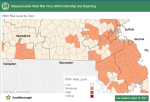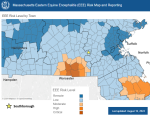Above: Although the health risks mosquitos pose are still low in Southborough, residents should take actions to protect themselves (and be aware of regions where risks are higher.)
I missed an important announcement from the Board of Health last week. The notice warned residents that one of the samples of mosquitos collected in Southborough on August 9th was detected to include West Nile Virus.
Although our Town’s risk is still low at this time, community members should take some precautions. Between that news and a story about a Massachusetts man who contracted EEE, it’s worth taking a look at the risk maps for our region.
While the highest risk of West Nile Virus in the state is still only moderate, there are areas that have been rated Critical Risk for EEE.
The latest risk maps issued on August 16th show a moderate risk for WNV in the bordering cities of Marlborough and Framingham. For EEE, the closest towns with even a moderate risk level are Grafton and Upton. (Click on images below for a closer look.)
While some residents worry about the WNV and EEE risks, I also hear from readers worried about pesticide spraying. If you want to know the latest spraying plans, you can find that through the Central Mass Mosquito Control Project’s website here.
The announcement from Southborough’s BOH, issued on Wednesday, states:
West Nile Virus Detected in Southborough Mosquito Sample – August 14, 2024
The Massachusetts Department of Public Health (MDPH) announced that West Nile Virus (WNV) has been detected in a mosquito sample collected on August 9 in Southborough. The risk of WNV in Southborough remains low at this time, but it is important to take precautions to prevent mosquito bites and mosquito-borne diseases.
While WNV can infect people of all ages, people over the age of 50 are at higher risk for severe disease. Most people infected with WNV will have no symptoms. When present, WNV symptoms tend to include fever and flu-like illness. In rare cases, more severe illness can occur.
Avoid Mosquito Bites
- Apply Insect Repellent when Outdoors. Use a repellent with an EPA-registered ingredient (DEET (N,N-Diethyl-m-toluamide), permethrin, picaridin (KBR 3023), oil of lemon eucalyptus (p-menthane-3,8-diol (PMD) or IR3535) according to the instructions on the product label. DEET products should not be used on infants under two months of age and should be used in concentrations of 30 percent or less on older children. Oil of lemon eucalyptus should not be used on children under three years of age.
- Be Aware of Peak Mosquito Hours. The hours from dusk to dawn are peak biting times for many mosquitoes. Consider rescheduling outdoor activities that occur during the evening or early morning in areas of high risk.
- Clothing Can Help Reduce Mosquito Bites. Wearing long sleeves, long pants, and socks when outdoors will help keep mosquitoes away from your skin.
Mosquito-Proof Your Home
- Drain Standing Water. Mosquitoes lay their eggs in standing water. Limit the number of places around your home for mosquitoes to breed by either draining or discarding items that hold water. Check rain gutters and drains. Empty unused flowerpots and wading pools and change the water in birdbaths frequently.
- Install/Repair Screens. Keep mosquitoes out with tightly fitting screens on windows and doors.
Protect Your Animals
- Animal owners should reduce potential mosquito breeding sites on their property by eliminating standing water from containers such as buckets, tires, and wading pools – especially after heavy rains. Water troughs provide excellent mosquito breeding habitats and should be flushed out at least once a week during the summer months to reduce mosquitoes near paddock areas. Horse owners should keep horses in indoor stalls at night to reduce their risk of exposure to mosquitoes. Owners should also speak with their veterinarian about mosquito repellents approved for use in animals and vaccinations to prevent WNV and EEE.
More information, including all WNV and EEE positive results, can be found on the Arbovirus Surveillance web page at Mosquito-borne Diseases | Mass.gov, which is updated daily.
For additional information, please contact the Southborough Health Department at: (508) 481-3013.





Shouldn’t the town notify residents of the services Central Mass Mosquito Control offer for the town of Southborough? After all it does come out of their taxes.
I stand corrected it was mentioned. They also offer tire recycle program as well!